At the Aspen Institute Economic Opportunities Program, and for our many colleagues and partners, the ongoing and intertwined health, economic, and racial justice crises bring new urgency to our work to improve access to quality jobs, options to participate in business ownership, and the freedom to pursue economic opportunity. Below we share our monthly newsletter with highlights of recent work. As always, we welcome your feedback, thoughts, and partnership in advancing inclusive opportunity and an economy in which we all can thrive. Click here to subscribe.
Click here to view past editions of our newsletter.
News and Updates
Joining Forces on the Future of Work
We are pleased to announce that the Institute’s Future of Work Initiative (FOWI) has merged with EOP. FOWI was established in late 2015 to develop bipartisan policy recommendations to address the challenges American workers face in a changing economy. FOWI’s emphasis on policy development complements EOP’s decades of research on organizational strategies to help more people thrive in the world of work and to address racial, gender, and geographic inequities in access to good jobs. The pandemic has shown us that the future of work is here, and the integration of programs will equip both teams to better address industry transitions, labor market inequalities, and tech in the workplace, as we face a daunting but essential recovery.
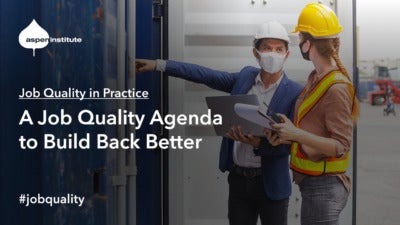
A Job Quality Agenda for the New Administration
Our country has an enduring belief that hard work should offer a pathway to economic mobility and security. But decades of inequality of opportunity and declining job quality have contributed to a reality that doesn’t align with that belief. Simply put, our economy needs more quality jobs. In a shared statement, the Aspen Institute’s Job Quality Fellows identify concrete policy and practice recommendations for the new administration to restore the ideal of work as the pathway to the American Dream. Read more.
Three of our Fellows—Betsy Biemann, Jose Corona, and Caryn York—joined us to discuss the statement and its implications for the new administration. The Fellows share a commitment to improving the lives and livelihoods of working people, and a belief that better jobs are not only possible, but essential to a vibrant economy and free society. We thank our many guests who took part in this dynamic conversation, which spurred lively interactions on both Zoom and Twitter (#jobquality). The video, audio, written transcript, and resources shared during the course of our conversation are now available on our website.
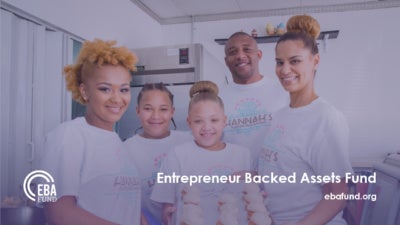
Announcing the Entrepreneur Backed Assets Fund
Community Development Financial Institutions (CDFIs) have stepped up to support small business owners affected by the pandemic, but doing so has strained their liquidity and financial strength. To address this challenge, last month we announced the creation of the Entrepreneur Backed Assets (EBA) Fund, an innovative new financial tool that will strengthen the capacity of CDFIs to lend to small businesses in low-income communities and those owned by people of color by creating a secondary market for their microloans. EBA Fund is a new nonprofit born out of collaboration among the Business Ownership Initiative, the CDFIs that are members of our Microfinance Impact Collaborative, and Revolve. Already EBA Fund has received positive coverage from the Chronicle of Philanthropy, Next City, ImpactAlpha, and more. For more information, read our press release and blog post and visit ebafund.org.
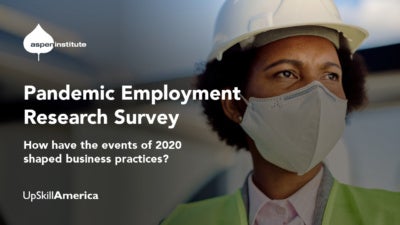
Pandemic Employment Research Survey
Throughout 2020, UpSkill America spoke directly with employers to learn how the global pandemic and heightened attention to systemic racism affected their company and spurred them to find new and better ways to operate. Now we are partnering with Training Industry, Inc. to learn how the events of the past year are influencing the types of skills needed by frontline workers, employer-funded education and training programs and other workplace supports for frontline and entry-level workers, and strategies to enhance equity and inclusion in the workplace. Business leaders, will you lend your insights to this important body of knowledge? Our survey should take about 15 minutes to complete, and your responses will be kept confidential. We will share results of the survey and host a public virtual event where select business leaders will share information about their education and training strategies. Please complete by close of business on Friday, February 5, 2021. Take the Pandemic Employment Research Survey.
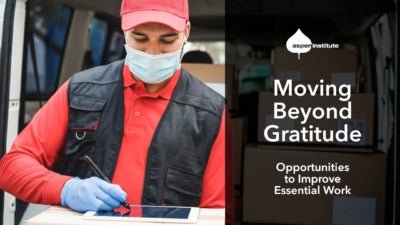
Moving Beyond Gratitude: Opportunities to Improve Essential Work
Among the many unexpected lessons of 2020 was a recognition of the importance of essential workers—the people who work in our food systems, care for our loved ones, deliver our packages, and keep our public spaces clean. We must do more than simply say “thank you” to essential workers—we must improve the quality of essential jobs. Last month we hosted a virtual discussion, “Moving Beyond Gratitude: Opportunities to Improve Essential Work,” featuring Angelina Drake (Chief Operating Officer at PHI, Aspen Job Quality Fellow, and former home care worker); Terrill Haigler/Ya Fav Trash Man (Philadelphia Sanitation Worker); Linda Nguyen (Chief of Staff at UFCW 770 and Aspen Job Quality Fellow); Zeynep Ton (Professor at MIT Sloan School of Management and author of The Good Jobs Strategy); Maureen Conway (Vice President, The Aspen Institute; Executive Director, Economic Opportunities Program); and moderator E.J. Dionne (Columnist, The Washington Post). Watch, listen, and learn more.
Following the event, our moderator E.J. Dionne shared his reflections in an op-ed for the Washington Post, including a shoutout to EOP’s work in this area. “In resolving to address our inequities,” he writes, “we should begin with those who gave the most: the ‘essential workers,’ from delivery drivers to health-care staff, from supermarket employees to meatpackers, without whom our society would pretty well have collapsed. We need to remember them long after the pandemic is over.” Read more.
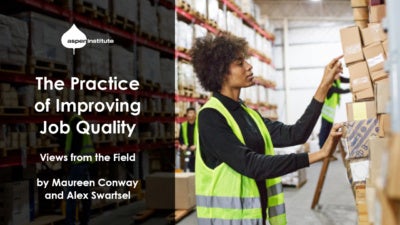
The Practice of Improving Job Quality: Views from the Field
While the low quality of many “essential” jobs has gotten increased attention amid the pandemic, the issue of low-quality jobs is longstanding. A new publication by EOP Executive Director Maureen Conway and Consultant Alex Swartsel, “The Practice of Improving Job Quality: Views from the Field,” is based on a survey of organizations about their efforts to advance job quality. Survey responses were gathered before the effects of the pandemic took hold, and understanding perspectives on job quality then can give us important insights as we tackle the urgent challenge of improving job quality now. Many organizations are working to improve job quality both within their own organizations and externally, but they face a variety of challenges. They are eager for more tools and resources to support their efforts. Read more.
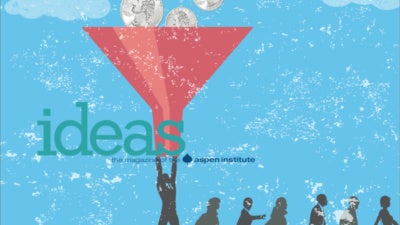
Journal of Ideas: Money Matters
After nearly a year of viral contagion and economic wreckage, inequality is ballooning while economic mobility is in free fall. What if financial markets—the ultimate capitalist tool—incentivized the social impacts the nation needs while delivering risk-adjusted returns? Writing for the IDEAS: the Magazine of the Aspen Institute, Good Companies/Good Jobs Initiative Director Mark G. Popovich and EOP Executive Director Maureen Conway describe the use an array of tools we use at the Aspen Institute to tackle these worker and social impact issues, including the Entrepreneur Backed Assets Fund, Aspen Finance Leaders Fellowship, and Working Metrics software. Read more.
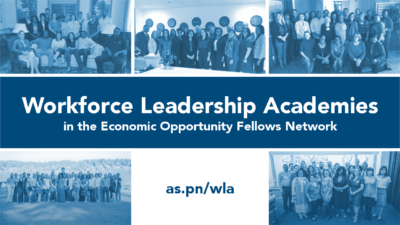
Updates from the Workforce Leadership Academies
We’re pleased to announce that Fellowship applications are currently being accepted for the Greater Phoenix Workforce Leadership Academy, offered in partnership with the Center for the Future of Arizona. To learn about this opportunity, eligibility, and how to apply visit ai-eop.submittable.com. As a new academy launches, Fellows in the Jackson Academy presented their Collaborative Leadership Projects, recommendations about how to strengthen the local ecosystem. Built on their shared commitment to racial equity and data that showed disparities in employment outcomes, Fellows focused on strengthening collaboration, supporting jobseekers in navigating the labor market, and creating career pathways that enable economic mobility. The first academy to be offered entirely online, Fellows built a community of leaders committed to continuing to work together to maximize the chances that all Jacksonians are a part of rebuilding back better. Learn more about the Workforce Leadership Academies at as.pn/wla.
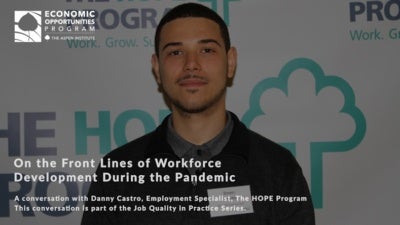
On the Front Lines of Workforce Development During the Pandemic
In the early months of the pandemic, EOP began speaking with workforce development organizations across the country as they strengthened existing strategies and tested new approaches to support workers. In New York City, The HOPE Program has adapted its services to continue connecting clients to jobs, including in food retail, warehousing and logistics, and teleservices. Leaders report that the organization, which provides lifelong career support, is serving an unprecedented number of clients as past and current program participants seek new opportunities to support themselves and their families. Danny Castro, an Employment Specialist at The HOPE Program, spoke with EOP Senior Project Manager Amanda Newman about his efforts to support clients to connect to work and make good employment decisions during the pandemic. Watch the interview.

Supporting Young Adults: Talking Race Equity & Job Quality with Employers
With support from the Annie E. Casey Foundation, Generation Work leaders in Cleveland developed an Employer Engagement Question Bank as a tool to equip workforce professionals to engage with businesses around job quality. On December 3, EOP Senior Evaluation Manager Ranita Jain and Grace Heffernan (Thomas P. Miller and Associates) provided an overview of the tool and context on issues of job quality and race equity when working with employers. Click here to download slides from “Supporting Young Adults: Talking Race Equity & Job Quality with Employers.”
Critical Community College Assets for 2021: National Perspectives
On January 27, Jain attended the AACC Workforce Development Institute as a featured speaker on “Critical Community College Assets for 2021: National Perspectives,” alongside Dr. Rebecca Corbin (National Association for Community College Entrepreneurship), Kimberly A. Green (Advance CTE), Kathy Mannes (Jobs for the Future), and moderator Dr. Darlene Miller (National Council for Workforce Education). Learn more.

Upskilling Trends in Corporate America
Upskilling investments, when done well, pay off for the employer, the worker, and the community. UpSkill America Director Jaime Fall sat down with Ramona Schindelheim of Working Nation for an edition of their Work in Progress podcast to share how employers need to understand the value to the individual, to their company, and to their communities in investing in workers and giving workers opportunities to advance. In a related conversation, Fall spoke with ETU, a sponsoring organization of UpSkill America, to share “key upskilling trends he is seeing in his work with America’s largest companies on their training and education strategies.” Listen to the podcast and read the interview.

Advancing Equity Through Employee Ownership
On January 9, EOP Executive Director Maureen Conway and Workforce Strategies Initiative Associate Director Jenny Weissbourd presented at the 2021 Kelso Conference, hosted by the Rutgers University School of Management and Labor Relations. Sharing insights from their forthcoming issue brief on employee ownership, Conway and Weissbourd presented alongside Todd Leverette (Legacy Business Program Manager, Democracy at Work Institute), who was a featured speaker at our October event, “Can Employee Share Ownership Improve Racial and Gender Wealth Equity?”

Gig Economy Workers & Retirement Security
Millions of workers in the gig economy lack basic workplace benefits, including retirement savings plans. On January 27, Future of Work Initiative Director Shelly Steward and Karen Biddle Andres (Director of Policy & Market Solutions, The Aspen Institute Financial Security Program) spoke at a webinar on “Gig Economy Workers & Retirement Security,” hosted by the National Institute on Retirement Security. They discussed how gig work, misclassification, and current tax policy create retirement challenges for millions of workers, and how new approaches, like state-facilitated auto-IRA plans, can improve outlooks. Watch the recording here.
Upcoming Events
EOP will continue to host virtual events and webinars this season. Join our mailing list and follow us on social media to learn when new opportunities are available.
Feb 2: Precarious Labor in the Gig Economy: In Search of Workplace Security
The platform-based gig economy makes up a small percent of the workforce, but reflects a major shift of risk onto individual workers that has happened across industries in recent decades. This shift has introduced new levels of insecurity to workers’ lives and raised important questions about the future of work. On February 2, from 7:00-8:30 p.m. ET, Future of Work Initiative Director Shelly Steward will take part in a virtual conversation on “Precarious Labor in the Gig Economy: In Search of Workplace Security.” The discussion, hosted by the Lorentzsen Center for Faith and Work, part of the Concordia College Offutt School of Business, will feature fellow speakers Joe Raso (President and CEO, Fargo Moorhead Economic Development Corporation) and Willy Solis (Gig Worker, Shipt.com; Lead Organizer, Gig Workers Collective). Click here to register.
Feb 18: Job Quality Can’t Wait: An Introduction to the Aspen Institute Job Quality Tools Library
Decades of stagnant wages, eroding benefits, and declining employment security have left millions of US workers in low-quality jobs. EOP developed the Job Quality Tools Library to provide actionable tools to help leaders strengthen job quality in their own organizations, in the businesses they work with, and in local labor markets. On February 18, EOP Executive Director Maureen Conway and Workforce Strategies Initiative Associate Director Jenny Weissbourd will join the Coalition on Adult Basic Education for a webinar introducing the library, including sharing why and how we developed it, explaining how to navigate it, and providing guidance about how to use it in your work to strengthen jobs and racial equity for adult learners. We’ll focus on tools and approaches that you can put to work immediately as you respond to the current crisis. Registration will be open soon. When available, you may sign up here.
Feb 24: Better Technology, Better Retirement Savings: Why Operations and Administrative Technology Matters for Saver Outcomes
Millions of workers lack access to retirement savings—and millions more are unable to use savings plans they have access to. How can technology drive better, more equitable savings outcomes for workers? Join the Future of Work Initiative and the Aspen Institute Financial Security Program for a two-part virtual series exploring how technology can improve workers’ retirement outcomes. The first event, on February 24, will ask: What must we accomplish with operations and administrative technology to modernize our retirement system – and what’s at stake if we don’t? Click here to register.
Join the conversation
Follow EOP on social media to join the conversation!
-Workforce Strategies Initiative @AspenWorkforce
-Business Ownership Initiative @Aspen_BOI
-UpSkill America @upskillamerica
-Future of Work Initiative @AspenFutureWork
About EOP
The Aspen Institute Economic Opportunities Program (EOP) advances strategies, policies, and ideas to help low- and moderate-income people thrive in a changing economy. We recognize that race, gender, and place intersect with and intensify the challenge of economic inequality and we address these dynamics by advancing an inclusive vision of economic justice. For over 25 years, EOP has focused on expanding individuals’ opportunities to connect to quality work, start businesses, and build economic stability that provides the freedom to pursue opportunity. For more information, visit as.pn/eop.
EOP has several initiatives, including the Business Ownership Initiative, Workforce Strategies Initiative, UpSkill America, Good Companies/Good Jobs, and the Future of Work Initiative. In addition, across these approaches EOP hosts the Economic Opportunity Fellows Network and the Opportunity in America event series.
Thank you to our many partners and funders for supporting our efforts.
Support Our Work
We are committed to making our events and publications freely available to everyone who finds them useful. But if you find value in our work and are able to support it, please consider making a tax-deductible donation. Click here to learn more.
Keep in Touch
Click here to join our mailing list. For updates every day, follow us on social media.

